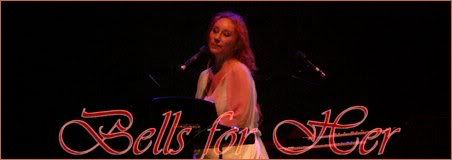Post by Julie on Apr 1, 2005 19:55:10 GMT -5
Little Amsterdam
Little Amsterdam
in a southern town
hominy get it on the plate girl
Momma keep your head down
Momma it wasn't my bullet
dont' tak eme back to the Range
I'm just comin out of the cell in my brain
girl you got to know these days
which side your on
Momma got shit
she loved a brown man
then she built a bridge in the Sheriff's bec
she'd do anything to save her man
you see her olives are cold pressed
and her best friend is a sun dress
but Momma it wasn't my bullet
round and a round and a round I go
round and a round this time for keeps
Father only you can save my soul
and playing that organ must count
for something
girl you got to know these days
which side your on
Little Amsterdam
shut down today
they buried her with a
butter bean bouquet
and the Sheriff now can't ride away
like he said into the sunset
and I won't say
he shouldna paid
but Momma
it wasn't my bullet
Here's Tori's description of it:
"Go further into the place of the South, the place of the hidden, with Little Amsterdam, which is all metaphorical, about wanting to kill people, being angry at people that you feel have done something... the whole domination thing, the whole hierarchy, patriarchy...and her way to fight back and they are blaming her but it wasn't her bullet but she still believes it would have been fine if..." She makes a soft gunshot noise. "They lost him".
-- Tori; B Side, 05/96
"The South represents so much that is hidden. This record is about the fragments that have been hidden. So naturally, I had to follow that ... and go after that frequency. There is a lot of domination in this song. The idea that you don't follow your heart because you're afraid that if you do that you can't have your family or you can't have your friends or that you'll be outcast. That's very much what the South has been about for me - speaking about that which was hidden could get you really ostracized."
-- Tori; Michael Jackson radio show, KABC, Feb 9, 1996
“And we travel further into Little Amsterdam, we go down South, which is really symbolic for the primal, the primitive, and the lies and the... really the domination.” [World Café (radio) – March 1, 1996]
“I’ve set it [Little Amsterdam] between two release points, an intro and outro. It helps the smell of this song, so you really get the honeysuckle with the sweet potatoes and the black-eyed peas. And just like you weave down those roads in the South, you know, you’re in swampland, and then you hit water, and then country, and sugar cane. And then you hit a gas station somewhere and you’re in a town, and you’ve gotten into the Christian sound. It’s like those writers I read as a little girl, Faulkner and Williams. This is how I write. It’s not about sitting down and putting 18 bars here or there.” [NY Times – Jan 14, 1996]
“I’m a big Faulkner fan, Tennessee Williams fan. How I would get taken into the story, there are so many levels of a story. There are so many levels of a dinner table conversation that’s happening, with the smells against what’s being said, the rhythm of the shuffled feet. Because you’re dealing with the unconsciousness as well as consciousness at every moment. The big thing that started to come to me in Amsterdam was... I mean, I’ll tell you this, just visitations of Sylvia Plath, as I would be singing ‘Don’t take me back to the range.’” [Really Deep Thoughts #10]
“The big thing that started to come to me in Amsterdam was... I mean, I'll tell you this, just visitations of Sylvia Plath, as I would be singing ‘don’t take me back to the range.’ ... The struggle of knowing I could kill him, knowing he should be killed, knowing I’m totally fine about it but Mom, that wasn’t my bullet. And I’m paying for it. I get fascinated by boundaries.” [Really Deep Thoughts - #10, Summer 1996]
 : Your Honor - Regina Spektor
: Your Honor - Regina Spektor
Little Amsterdam
in a southern town
hominy get it on the plate girl
Momma keep your head down
Momma it wasn't my bullet
dont' tak eme back to the Range
I'm just comin out of the cell in my brain
girl you got to know these days
which side your on
Momma got shit
she loved a brown man
then she built a bridge in the Sheriff's bec
she'd do anything to save her man
you see her olives are cold pressed
and her best friend is a sun dress
but Momma it wasn't my bullet
round and a round and a round I go
round and a round this time for keeps
Father only you can save my soul
and playing that organ must count
for something
girl you got to know these days
which side your on
Little Amsterdam
shut down today
they buried her with a
butter bean bouquet
and the Sheriff now can't ride away
like he said into the sunset
and I won't say
he shouldna paid
but Momma
it wasn't my bullet
Here's Tori's description of it:
"Go further into the place of the South, the place of the hidden, with Little Amsterdam, which is all metaphorical, about wanting to kill people, being angry at people that you feel have done something... the whole domination thing, the whole hierarchy, patriarchy...and her way to fight back and they are blaming her but it wasn't her bullet but she still believes it would have been fine if..." She makes a soft gunshot noise. "They lost him".
-- Tori; B Side, 05/96
"The South represents so much that is hidden. This record is about the fragments that have been hidden. So naturally, I had to follow that ... and go after that frequency. There is a lot of domination in this song. The idea that you don't follow your heart because you're afraid that if you do that you can't have your family or you can't have your friends or that you'll be outcast. That's very much what the South has been about for me - speaking about that which was hidden could get you really ostracized."
-- Tori; Michael Jackson radio show, KABC, Feb 9, 1996
“And we travel further into Little Amsterdam, we go down South, which is really symbolic for the primal, the primitive, and the lies and the... really the domination.” [World Café (radio) – March 1, 1996]
“I’ve set it [Little Amsterdam] between two release points, an intro and outro. It helps the smell of this song, so you really get the honeysuckle with the sweet potatoes and the black-eyed peas. And just like you weave down those roads in the South, you know, you’re in swampland, and then you hit water, and then country, and sugar cane. And then you hit a gas station somewhere and you’re in a town, and you’ve gotten into the Christian sound. It’s like those writers I read as a little girl, Faulkner and Williams. This is how I write. It’s not about sitting down and putting 18 bars here or there.” [NY Times – Jan 14, 1996]
“I’m a big Faulkner fan, Tennessee Williams fan. How I would get taken into the story, there are so many levels of a story. There are so many levels of a dinner table conversation that’s happening, with the smells against what’s being said, the rhythm of the shuffled feet. Because you’re dealing with the unconsciousness as well as consciousness at every moment. The big thing that started to come to me in Amsterdam was... I mean, I’ll tell you this, just visitations of Sylvia Plath, as I would be singing ‘Don’t take me back to the range.’” [Really Deep Thoughts #10]
“The big thing that started to come to me in Amsterdam was... I mean, I'll tell you this, just visitations of Sylvia Plath, as I would be singing ‘don’t take me back to the range.’ ... The struggle of knowing I could kill him, knowing he should be killed, knowing I’m totally fine about it but Mom, that wasn’t my bullet. And I’m paying for it. I get fascinated by boundaries.” [Really Deep Thoughts - #10, Summer 1996]
 : Your Honor - Regina Spektor
: Your Honor - Regina Spektor


